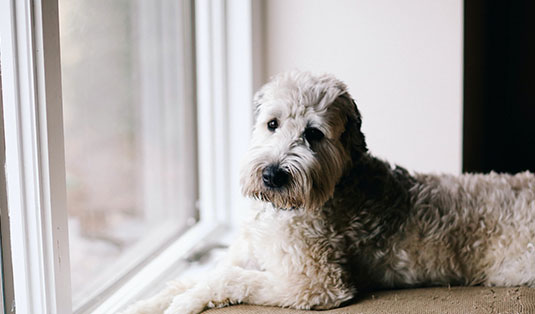Why is it so Hard to Rent with Pets?
November 17th, 2022
Over the years, Britain has acquired the reputation of being ‘a nation of pet lovers’ however, in spite of this fact, it is notoriously difficult to rent a property with a pet (particularly cats and dogs).
Those looking to move with their furry friends are frequently faced with what can feel like endless rejections from landlords who are not willing to rent to pet owners. In fact, 75% of pet owners face difficulty trying to find pet-friendly properties to rent, while ‘just 7% of private landlords advertise pet friendly properties.‘ So, the question remains, why is it so hard to rent with pets in such an animal-loving nation?
Are landlords unwilling?
The reasons behind landlords’ unwillingness to allow larger pets, like cats and dogs, into their properties are simple – they are generally more likely to be disruptive and cause damage.
I’m sure all dog owners can recall the moment your dog sees a cat/bird/fox/squirrel/child (the list goes on!) out the window and starts barking incessantly. Similarly, every cat owner knows the frustration of buying your cat the most expensive cat tree available, only to come home to find that your cat actually prefers to claw the sofa and carpet instead.
Who forgoes the cost of damages?
Unfortunately, the cost for repairing this kind of damage usually has to be borne by landlords themselves and, according to Compare the Market, most ‘standard home insurance policies won’t cover accidental damage caused by pets.‘
The Tenant Fee Ban
Sadly, renting with a pet has actually become more difficult since June 2019. Previously, many landlords allowed renters with pets if the tenants were willing to pay a higher deposit to ‘mitigate for potential damage.’ However, the Tenant Fee Ban (introduced in June 2019) prohibited landlords from increasing security deposits to sums larger than 5 weeks’ rent, leaving landlords with no option to protect themselves against the potential risk of allowing pets.
What can renters do to bring their fluffy friend along with them?
So, whilst the concerns behind landlords’ reluctance to allow pets into rental properties are not unreasonable, the question for tenants is: what can I do to bring my fluffy friend along with me?

Landlords can prohibit pets
First, it is important for any prospective tenant to note that it is within landlords’ rights to prohibit pets, under reasonable grounds. However, our advice to renters wanting to bring their pets along with them is to have what we call a ‘responsible care plan’ in place.
A responsible care plan
If you can assure the landlord that you have arrangements in place to responsibly look after your pet and minimise the risk of damage and disruption, most landlords (unless prohibited by a head-lease) are usually happy to allow renters with pets.
Caring for your pet
The biggest challenge we face as an office with regards to landlords not permitting pets, is tenants who generally have improper care plans (which sometimes involve leaving pets unattended and loose in a flat for 8+ hours). In these cases, the possibility of noise nuisance/damage is high here.
Responsible Care Plan for Renting With Your Dogs

- Consider the age and size of your dog – an old Great Dane that struggles to make it up stairs is not going to be a good fit in a small top floor studio flat.
- Is your dog crate trained so that when you are not in the flat it is secured and cannot cause damage?
- Do you take your dog to work with you, or work from home? If you work away from home and can’t take your dog with you, having a dog day care, a friend or dog sitter who takes your dog during the day is key. Dogs being left alone in flats for extended periods is generally a landlord’s biggest concern. Your dog might behave brilliantly whilst you’re there but when left alone might, unbeknownst to you, be a nightmare.
- Be honest – is your dog known to be noisy and bark a lot? If yes, search for flats where noise is unlikely to impact other residents so that noise complaints don’t become an issue.
- Consider putting in writing from the start that, when you leave, you’ll have the flat professionally steam cleaned – including upholstery. Landlords can’t request this or force you to but, offering it upfront will reassure landlord’s that you intend to leave the flat nice and clean.
Responsible Care Plan for Renting With Your Cats

- Consider the age and size of your cat – kittens tend to be much more prone to damaging properties than older cats.
- Is your cat an indoor cat or not? It seems obvious but if your cat has always been allowed outside, suddenly confining it indoors because you no longer have a garden flat can result in behaviour you haven’t experienced before. This can include marking of upholstery and destructive scratching behaviour. If you have an outdoor cat, make sure you look for somewhere where it can easily access outdoors.
- Consider putting in writing from the start that when you leave, you’ll have the flat professionally steam cleaned – including upholstery. Landlords can’t request this or force you to but, offering it upfront will reassure landlord’s that you intend to leave the flat nice and clean.
- Litter training – again, older cats tend to be much more reliable with this so landlords are often less nervous about tenants with adult cats vs. kittens.
- Carpets and furniture – cats love to scratch carpet and upholstery so unfurnished flats with laminate flooring are ideal as the risk of potential damage is minimal. This should reassure your landlord that they’re unlikely to bear potential ‘pet damage’ repair costs at the end of a tenancy. This in turn, makes them more likely to permit pets.
Responsible Care Plan for Renting With Your Small Animals

- Small pets tend not to worry landlord’s as much, but it is still important to ask and make sure they’re comfortable with you having animals in the property. This gives them a chance to ask you any questions they might have, and you to offer reassurances. Please don’t assume that just because your pet is small and lives in a cage you don’t need to ask your landlord’s permission!
The Future For Renting With Our Pets
It’s not all doom and gloom for renters hoping to bring their pets along with them. In recent years, the issue of renting with pets has been brought to the government’s attention and measures to rectify this difficulty are being enacted and discussed.
Model tenancy agreement
In 2021, for instance, the government updated their ‘model tenancy agreement‘, which now prohibits landlords from issuing ‘blanket bans’ on pets. According to lettingaproperty.com, “allowing pets is now the default position on the government’s recommended model tenancy agreement.” The issue here, however, is that this position is not yet mandated.
Most significantly perhaps, is the fact that legislation which will aid renters with pets is currently on the cards and is awaiting its second reading in Parliament. The Dogs and Domestic Animals Accommodation Protection Bill aims to ‘establish rights to keep dogs and other animals in domestic accommodation’. So, for those frustrated by the difficulty of renting with pets, there is hope for you all in the future.
Related Articles: New standard tenancy agreement to help renters with well behaved pets
By Imogen Bahl
Want to
Stay in Touch?
Sign Up to our Newsletter

Emma's Estate Agents is a trading name of Emma’s Estate Agents Ltd. Est. 1995 (©) 2022. VAT No: 248 9798 28. All Rights Reserved. Ombudsman Membership Number: T06664


